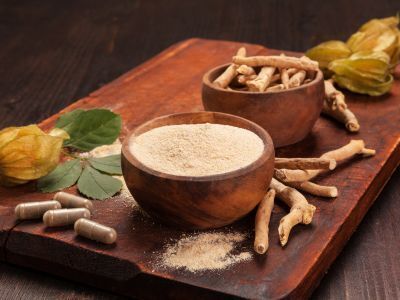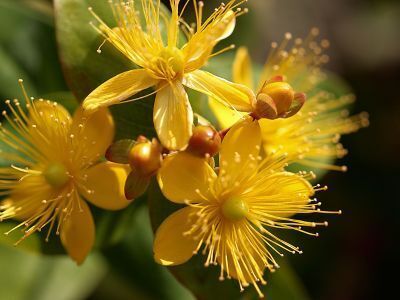Ashwagandha in Medicine, Mood and Neuropsychiatry

Revised from the original blog authored by Donnie Yance, CN, RH (AHG)
(For the full blog and list of references, please visit: https://www.donnieyance.com/ashwagandha-withania-somnifera-in-medicine-mood-and-neuropsychiatry/)
Ashwagandha (Withania somnifera) holds a special place in traditional medicine, particularly in Ayurvedic practice where it's known as a Rasayana herb - one that rejuvenates the body and promotes overall health. Its name reflects its dual nature: "ashwagandha" means "strong as a horse," while "somnifera" refers to its sleep-promoting properties.[1,2]
For over 2,500 years, this remarkable plant has been used to strengthen the nervous system and enhance disease resistance. Modern research now validates many of these traditional applications, particularly in treating neurological and psychiatric conditions.[3]
Key Benefits and Research Findings
Stress and Anxiety Management
Clinical studies demonstrate ashwagandha's effectiveness in reducing anxiety and stress. A systematic review of human trials showed significant improvements in anxiety and stress scales compared to placebo treatments.[23] In one notable study, participants taking ashwagandha experienced a 44% reduction in stress levels, compared to just 5.5% in the placebo group.[30]

Sleep Enhancement
Recent research reveals ashwagandha's potential in improving sleep quality. A double-blind, placebo-controlled trial found that participants taking a standardized ashwagandha extract reported a 72% improvement in sleep quality, while the placebo group only saw a 29% improvement. The study also noted improvements in sleep efficiency, total sleep time, and sleep onset latency.[27]
Depression and Mood Support
Ashwagandha shows promise in supporting mood health through multiple mechanisms. Research indicates it helps modulate various neurotransmitters involved in mood regulation, including serotonin, noradrenaline, and dopamine.[8-10] The herb appears particularly effective when combined with conventional treatments for anxiety and depression.[24]
Cognitive Function and Neuroprotection
Studies demonstrate ashwagandha's beneficial effects on brain function:
- Improves memory and attention span[31]
- Enhances learning ability
- Protects brain cells from oxidative stress
- Shows promise in neurodegenerative conditions[36]

Recent research indicates potential applications in various neurological disorders, including Parkinson's disease, Alzheimer's disease, and Huntington's disease.[3] The herb appears to work through multiple mechanisms, including:
- Reducing inflammation in the brain
- Protecting against oxidative damage
- Supporting healthy brain cell function
- Promoting neuroplasticity[28]
Thyroid Function
Research shows ashwagandha may help improve thyroid function in people with subclinical hypothyroidism.[34] This is particularly relevant as thyroid dysfunction often correlates with mood disorders and cognitive issues.[32,33]
How Ashwagandha Works
As an adaptogen, ashwagandha helps the body maintain homeostasis through complex mechanisms.[19] It works by:
- Modulating stress response systems
- Balancing neurotransmitter activity
- Supporting cellular energy production
- Reducing inflammation
- Protecting against oxidative stress[20]
The herb contains multiple bioactive compounds, particularly withanolides, that contribute to its therapeutic effects. These compounds work synergistically to produce what researchers call a "disease-modifying" effect.[6]

Synergistic Combinations
Research suggests ashwagandha's benefits may be enhanced when combined with other natural compounds:
- St. John's Wort for mood support (shown in recent meta-analyses to be comparable to certain conventional treatments)[54]
- L-Tyrosine for cognitive performance and stress resilience[43,44]
- Magnolia bark for additional stress relief[53]
These combinations may offer enhanced benefits for overall mental well-being and stress management, though more research is needed to fully understand their interactions.
Safety and Usage
While ashwagandha shows remarkable promise, it's important to note that most successful clinical trials used standardized extracts under medical supervision. A typical effective dose in studies ranged from 250-600mg per day of root extract.[31] Always consult with a healthcare provider before starting any new supplement regimen, especially if you're taking medications or have existing health conditions.
Conclusion
Modern research continues to validate ashwagandha's traditional uses while uncovering new applications in neuropsychiatry and cognitive health. Its ability to support multiple aspects of mental health - from stress management to cognitive function - makes it a valuable tool in the natural health arsenal. As research continues, we may discover even more applications for this remarkable herb in supporting mental health and cognitive function.
Join the Mederi Center community by signing up for our email list! We send several emails a month with product promotions for patients, practical tips for healthy living, blogs written by our practitioners, information about events, and other news. You can unsubscribe at any time.
akjkj
kjkji

Meet Donnie Yance!
Donnie Yance is an internationally known master herbalist and nutritionist, and the author of Herbal Medicine, Healing and Cancer and Adaptogens in Medical Herbalism: Elite Herbs and Natural Compounds for Mastering Stress, Aging and Chronic Illness. After decades of extensive research and clinical practice, he developed an integrative approach to health and healing called the Eclectic Triphasic™ Medical System (ETMS), referred to as Mederi Care. Donnie is also the founder Mederi Academy, as well as the founder and formulator of Natura Health Products, a therapeutic-grade botanical and nutritional supplement line. These products have made a significant contribution to his tangible success in improving the health of his patients.
Learn more about Donnie Yance >>
Become a patient >>


